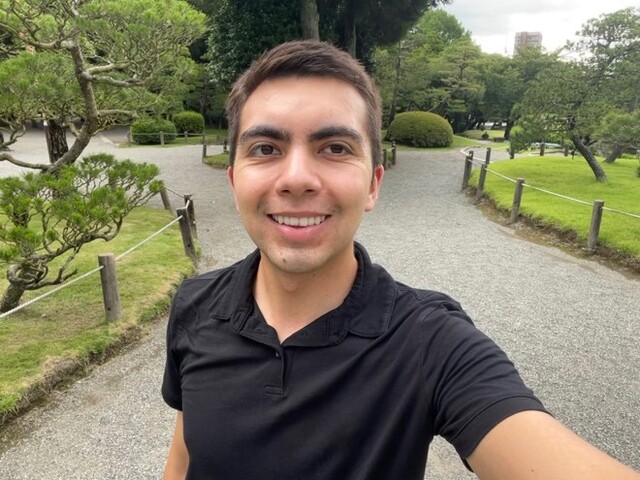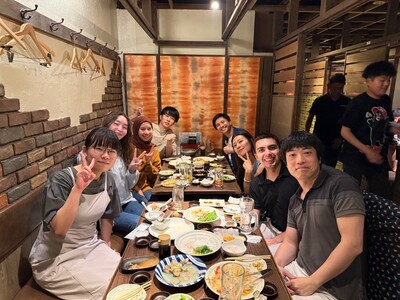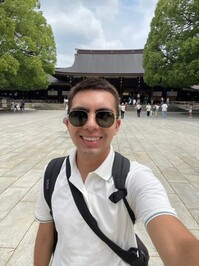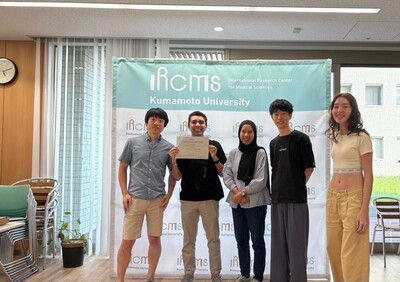- HOME
- Education
- Student's Voice
- 【IRCMS Internship】Mr. Jose Hector Gibran Fritz Garcia (Johannes Gutemberg University)
Student's Voice

Name: Jose Hector Gibran Fritz Garcia
Johannes Gutemberg University, Germany
Visiting Period: June 24th (Tue), 2025 - July 26th (Sat), 2025
Country: Mexico
Lab: Laboratory of Proteostasis in Stem Cell
Q1. Summary of the internship (Description of the research conducted, aim, introduction of lab, and things you learned)
I had the privilege of spending five weeks, from June 24th 2025 to July 25th 2025, in the Proteostasis in Stem Cells group under the supervision of Prof. Miharada at IRCMS, Kumamoto University.
To function properly, proteins within cells require a balanced mechanism for their synthesis, folding and degradation. This process, known as proteostasis, operates in a cell type- and development-specific manner. The lab aims to understand proteostasis and metabolic regulation in stem cells, specifically hematopoietic stem cells, at the feto-maternal interface and during organ development.
During the internship, I primarily set up a mouse hepatic organoid culture system and assessed the effects of various cytokines on organoid growth and expression levels using colony formation assays. Additionally, I assisted lab members with lung culture experiments as well as quantitative reverse transcriptase PCR (qRT-PCR).

Q2. What did this experience do for you with respect to your specific career development directions?
I had never worked with organoids prior to this internship. This experience allowed me to independently lead a project--from designing experiments and analyzing results to troubleshooting when experiments did not go as expected.
In addition to my summer project, I was in close contact with handling mouse models to understand how different conditions affects pregnancy by looking at embryo and placenta size. This was pretty valuable to me, as I have a strong interest in understanding how the mother and placenta cooperate to support the growth and development demands of the embryo.
The diverse projects in the Miharada lab, along with the institutional and weekly seminars, helped me develop a broader perspective on scientific research.
Q3. What did you enjoy about life at Kumamoto University (Kumamoto city or Japan)?
City life in Japan is both innovative and convenient. I enjoyed the numerous options of restaurants, izakayas, convenience stores and shopping malls that you can find not only in Kumamoto but throughout Japan. I also appreciated the possibility of coming across small shrines when exploring the city.
In Kumamoto specifically, getting around to places like Kumamoto Castle or Suizenji Park was easy whether by walking, biking or using public transportation. I also had the chance to try and enjoy traditional food such as basashi (horse sashimi), takoyaki (octopus balls), Kumamoto-style ramen and of course, sushi and fish sashimi, among others.
During the weekends, I was able to visit Tokyo, Kyoto, Fukuoka and Osaka. The fast-paced daily life in these larger cities reminded of my home country, and I found it easy to blend in with the crowds.
There were a few minor cultural surprises, such as vehicles driving on the left side of the road and the fact that public trash bins were surprisingly rare, but I quickly adapted to these differences.
Overall, I had a very positive and enriching summer experience in Kumamoto -- and in Japan as a whole.

Photo2: Meiji Shrine in Tokyo
Message to prospective students
I highly encourage students to apply for the internship at IRCMS for several reasons. First, it is a valuable opportunity for anyone considering a career in science. Second, IRCMS is well-equipped with top-notch facilities that make conducting research smooth and efficient. Moreover, the institute - from the administrative staff to the scientists - fosters a supportive and international community where people are genuinely willing to help one another. Events such as the IRCMS Happy Hour foster integration and interaction with members from others research groups. The wide range of research topics at IRCMS also facilitates collaborations, especially given the presence of other research on the Kumamoto University campus.
Principal investigators are approachable and open discussing science and, beyond research, they are eager to share their personal experiences and career advice, offering valuable insights into navigating both the scientific research and academic careers. Plus, it's Japan!

Photo3: Group photo at the end of the internship
